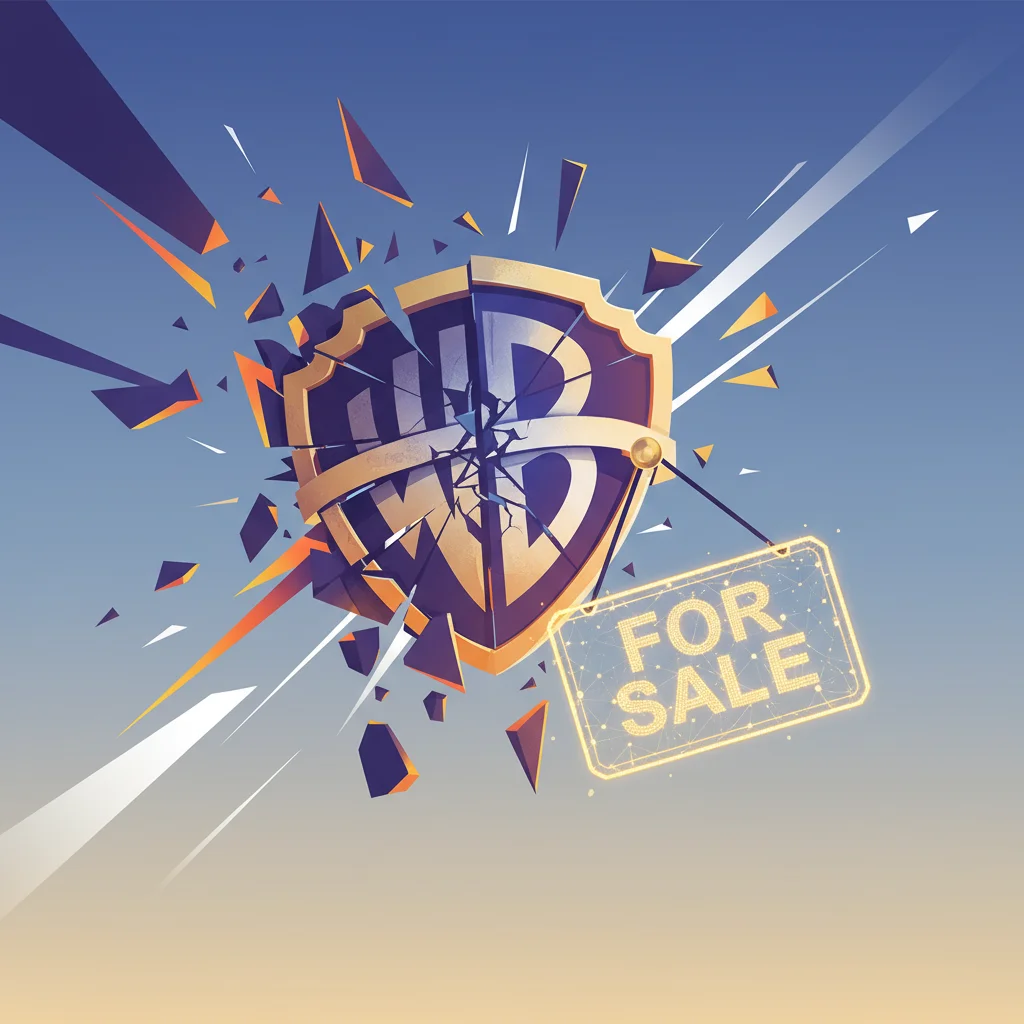
The End of an Era? Warner Bros. Discovery Hangs a “For Sale” Sign on a Media Empire
In a move sending shockwaves through Hollywood, Wall Street, and living rooms across the globe, Warner Bros. Discovery has officially signaled its openness to a sale. An announcement, first highlighted by a report from the BBC, confirms that the media conglomerate is actively listening to offers, setting the stage for what could be one of the most significant media mergers in a generation. This isn’t just a corporate transaction; it’s a potential seismic shift for an empire that houses everything from the dragons of House of the Dragon and the gritty journalism of CNN to the reality TV empire of Discovery.
For investors, finance professionals, and anyone with a stake in the modern economy, this development is a critical case study in corporate strategy, debt management, and the brutal economics of the streaming wars. The decision to explore a sale is the culmination of a tumultuous period following the blockbuster 2022 merger of WarnerMedia and Discovery, Inc. What was once heralded as the creation of a new global entertainment titan has been a painful journey of cost-cutting, strategic pivots, and a languishing stock price. Now, the curtain may be rising on its final act—or a dramatic new beginning under a different owner.
The Troubled Marriage: How a Media Behemoth Stumbled
To understand why a company of this magnitude is on the block, we must rewind to the ambitious merger that created it. In 2022, AT&T spun off its WarnerMedia assets to combine with Discovery, Inc., a deal orchestrated by CEO David Zaslav. The thesis was simple: combine Warner’s premium scripted content (HBO, Warner Bros. films) with Discovery’s unscripted reality juggernaut (HGTV, Food Network) to create a streaming service with unparalleled breadth and a business with diversified revenue streams.
The reality, however, has been far more complex. The merger saddled the new entity, Warner Bros. Discovery (WBD), with a staggering mountain of debt, which stood at approximately $43 billion as of early 2024. This colossal financial obligation has dictated nearly every major decision made by Zaslav’s leadership team. The post-merger era has been defined by:
- Aggressive Cost-Cutting: Zaslav embarked on a highly publicized, and often controversial, campaign to slash billions in spending. This included shelving nearly completed films like Batgirl for tax write-offs, removing swathes of content from the Max streaming service to avoid paying residuals, and significant layoffs across the company.
- Strategic Reversals: The company has vacillated on its strategy, initially pulling back from a “streaming-first” model to re-emphasize theatrical releases and content licensing to rivals—a move designed to generate immediate cash flow.
- A Punished Stock Market Performance: Despite Zaslav’s focus on cleaning up the balance sheet, the stock market has remained deeply skeptical. WBD’s stock has performed poorly since the merger, reflecting investor concerns about its long-term growth prospects in a landscape dominated by giants like Netflix and Disney.
This journey has been a masterclass in the unforgiving nature of modern finance and investing. While deleveraging is a sound financial goal, the methods used have, at times, been perceived as damaging the company’s creative core and brand equity, leaving the door wide open for a suitor to argue they can unlock value that current management cannot.
The Trillion-Dollar Handshake: Decoding the New Middle East's Impact on Global Finance
Valuing an Empire: The Crown Jewels and the Heavy Chains
Any potential buyer isn’t just acquiring a company; they are acquiring a century of cultural history, iconic intellectual property (IP), and a complex web of modern media assets. A proper valuation requires a clear-eyed look at both the incredible strengths and the significant liabilities. The table below breaks down the core components of the Warner Bros. Discovery portfolio.
| Asset Category | Key Brands & Franchises | Strategic Value & Associated Challenges |
|---|---|---|
| Film & Television Studios | Warner Bros. Pictures, New Line Cinema, DC Studios, Warner Bros. Television | Value: A legendary film library and powerful IP like Harry Potter and the DC Universe. Challenge: The DC film strategy has been inconsistent, and the traditional studio model faces pressure from streaming economics. |
| Premium Networks & Streaming | HBO, Max, Magnolia Network | Value: HBO is the undisputed gold standard for prestige television. Max has a deep content library. Challenge: High content costs and intense competition in the “streaming wars” have squeezed profitability. |
| Linear Cable Networks | Discovery Channel, HGTV, Food Network, TLC, TNT, TBS | Value: Still significant cash-flow generators from cable subscription fees and advertising. Challenge: Cord-cutting is an irreversible trend, making these depreciating assets in the long-term economy. |
| Global News | CNN Worldwide | Value: A globally recognized brand with immense reach and journalistic infrastructure. Challenge: Navigating political polarization, declining linear ratings, and finding a sustainable digital model. |
The ultimate price tag will be a battle between these competing forces. A buyer will pay a premium for the DC and Harry Potter IP, but they will discount the value based on the declining linear networks and the massive debt that must be assumed or refinanced. This complex financial modeling is where banking and M&A teams will earn their fees, trying to project future cash flows in a rapidly changing industry.
The Suitor’s Ball: Who Could Afford to Buy Hollywood?
The list of potential buyers with the financial firepower and strategic rationale to acquire a company of WBD’s scale is short and exclusive. The main contenders fall into a few key categories:
- The Logical Rival: Comcast/NBCUniversal
This is the most talked-about scenario. A merger between WBD and NBCUniversal would create a media entity on the scale of Disney. The synergies are undeniable: combining the Universal and Warner Bros. film studios, merging the Peacock and Max streaming services, and consolidating a massive portfolio of cable networks. However, the regulatory hurdles would be immense. Antitrust regulators in the U.S. and Europe would be deeply concerned about the market concentration, making this a high-risk, high-reward play. - The Tech Disruptors: Apple or Amazon
For Big Tech, content is a means to an end—it keeps users locked into their lucrative ecosystems. Apple TV+ and Amazon Prime Video are formidable, but acquiring WBD would give either company an instant, world-class library and production engine. The challenge? Media is a low-margin, high-headache business compared to selling iPhones or cloud services. It would represent a massive strategic shift and an invitation for intense regulatory scrutiny. The integration of such different corporate cultures would also be a monumental task. - The Financial Engineers: Private Equity
A consortium of private equity firms could see an opportunity for a leveraged buyout. Their playbook would likely involve breaking the company up and selling the pieces. For example, they could sell the film studio to one buyer, the HBO/Max assets to another, and let the linear networks run for cash until they expire. This is a pure finance play, focused on extracting value rather than building a long-term strategic media company.
IMF Sounds the Alarm: A .5 Trillion Hidden Risk Looms Over the Global Banking System
The Ripple Effect: What a Sale Means for the Market, the Industry, and You
A transaction of this magnitude would not happen in a vacuum. The fallout would be felt across the financial and cultural landscape.
- For Investors & the Stock Market: The immediate impact is uncertainty, which can lead to volatility in WBD’s stock. The prospect of a bidding war could drive the price up in the short term, offering a potential exit for long-suffering shareholders. Any M&A deal of this size requires sophisticated financial instruments and banking support, representing a major event for the entire financial sector. For those involved in trading, WBD will become a stock to watch, with its price reacting to every rumor and report.
- For the Media Industry: A WBD sale would likely trigger a final wave of major media consolidation. Mid-sized players like Paramount Global would face immense pressure to find a partner to compete. The long-term fear is the creation of a media oligopoly, with just three or four colossal companies controlling the majority of what we watch, potentially stifling independent voices and creativity.
- For Consumers: The end-user experience is at stake. Would a combined Max/Peacock service cost more? Would beloved but niche HBO shows be canceled in a new wave of cost-cutting? The direction of a global news source like CNN could be altered under new ownership. Ultimately, consolidation often leads to less choice and higher prices for the consumer.
- For the Broader Economy: This deal touches upon the core principles of modern economics—the tension between consolidation for efficiency and competition for innovation. It also highlights the transformative power of financial technology (fintech), as any due diligence process would leverage advanced data analytics to value everything from streaming viewership patterns to global IP licensing rights.
The 1 Million Question: Inside BlueCrest's Landmark Settlement and the Battle for Investor Trust
An Uncertain Future for an Iconic Legacy
Warner Bros. Discovery stands at a historic crossroads. Born from a desire to compete and survive, it now finds itself a potential acquisition target, a testament to the brutal realities of debt, market expectations, and technological disruption. The names on its roster—HBO, DC Comics, CNN, Warner Bros.—are more than just brands; they are pillars of 20th and 21st-century culture. As reported by sources like the Guardian, talks with potential partners like Paramount have already been explored, signaling that the engine for a deal is already warm.
The coming months will be filled with speculation, financial maneuvering, and high-stakes negotiations. The outcome will not only determine the future of this storied company but will also draw the new map for the global media and entertainment industry. For now, everyone is watching, waiting to see who will step up to buy a piece of Hollywood history and, in doing so, shape the future of storytelling itself.


